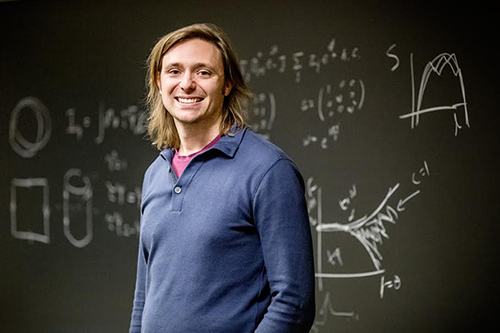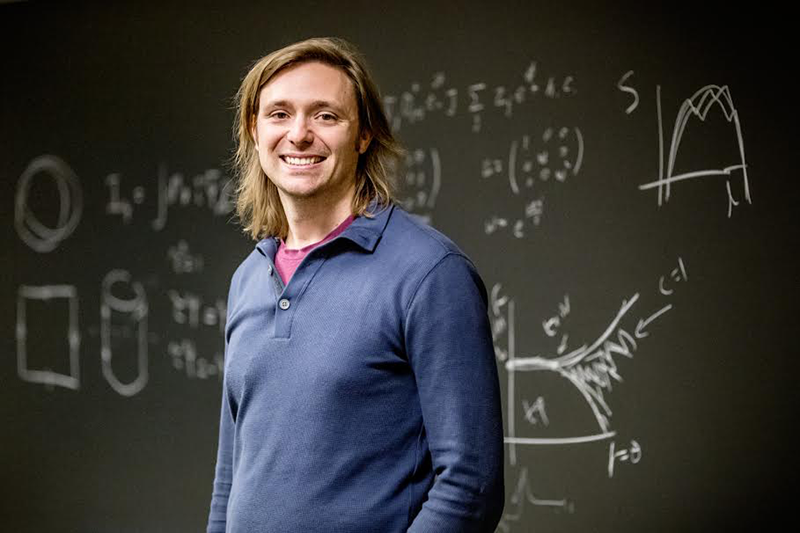Q&A: Topologically Speaking
As an undergraduate, Taylor Hughes worried that a career in condensed matter would involve just “dirty materials and detailed engineering.” But Hughes’ lively Ph.D. advisor at Stanford turned him on to the idea that solids could be just as exotic as string theory—with the bonus that predictions could actually be tested in the lab. Today, Hughes leads a theory group at the University of Illinois at Urbana–Champaign, where he enjoys working on both materials science and more obscure topics, like condensed-matter analogs for gravitational phenomena. His main interest, however, are the recently discovered topological materials—fundamentally weird materials that seem promising for robust quantum computing. He explained what he likes best about working in this field, and where it’s headed.
–Jessica Thomas
What are topological materials?
The most important feature of a topological material is that something about it is robust and insensitive to perturbations and impurities. A topological property is something that stays the same if you continuously change the system: Stretching it, straining it, shaving off some layers—or really any change that doesn’t cause a phase transition.
What might that property be?
It can be the conductivity in some direction. Or some kind of optical property: You can shine light on the material and when it reflects, its polarization may rotate by an angle that is the same no matter if the material has tons of impurities or is completely clean. Another example is the quantum Hall effect (when a two-dimensional electron gas is in a magnetic field), where there’s a quantized, robust value of the Hall conductivity.
Topological materials often have robust surface states with remarkable features that can be reproduced in all kinds of samples. There is a natural insensitivity to details and that’s very compelling for a theorist. It means we can hope to pare down a complicated model and make a prediction that exactly matches experiment.
From an applications standpoint, what might be useful about these properties?
Nobody has come up with the “killer application” for topological materials. Right now we’re in the fundamental physics realm.
One thing that is promising goes back to the surface states. The states on the edge of a quantum Hall effect device only go in one direction. If you try to block these states with some impurity, they just go around it. So, if you wanted to use these states in some sort of wire or interconnect, they’d be insensitive to impurities or imperfections. They’d just plough right through them.
What’s your perspective on using topological materials in quantum computers?
The quantum computing aspect is actually really exciting. Qubits of topological insulators may be more immune to errors and decoherence. But they’ve got their own challenges. Nobody has successfully made a qubit from a topologically insulating material. Some of the best experimentalists and materials scientists are working in that direction, which means I think it will happen.
Now, whether you can make one qubit, or fifty, depends. Right now ion traps and superconducting qubits are on the order ten, so those are two of the leading technologies. Topological insulators may take over if there’s a limit to these other qubits that topological insulators can beat, but we don’t know yet.
What’s exciting to you about working in this field?
One thing is that it’s a new field. And because it involves “weakly correlated” physics, we can actually hope to make precise calculations about what is going to happen in experiments. It’s just a matter of asking the right question. That, to me, lends itself to more creativity, in a way that I feel can be rewarding. Whereas, if I came up with a new theory of high-temperature superconductivity, nobody would believe it but me.
What is your advice to a young person who wants to enter this field?
Work on communication skills. It’s really one of the limiting factors when you go from grad school, to post doc, to faculty. Someone who communicates well will do better because communication is key for writing grants and papers, for efficiently working with other people, and for making people interested in what you’re doing.
Why do you think it’s hard to motivate an interest in condensed matter for the general public?
It’s hard because you can’t say it in one sentence. You can’t say you’re studying the most fundamental, smallest object ever created in the Universe and you can’t say you’re studying how the Universe evolves. You have to say, “Do you remember the electron from chemistry…?” The concept of “emergence” in complex systems is one of the most exciting aspects of condensed matter. But it’s subtle and not easy to convey.
Last question: How do you know if a material you’re holding in your hand is topological?
I’ve never actually held one. The experimentalists usually don’t want you to get your fingerprints on the samples.
Know a physicist with a knack for explaining their research to others? Write to physics@aps.org. All interviews are edited for brevity and clarity.





